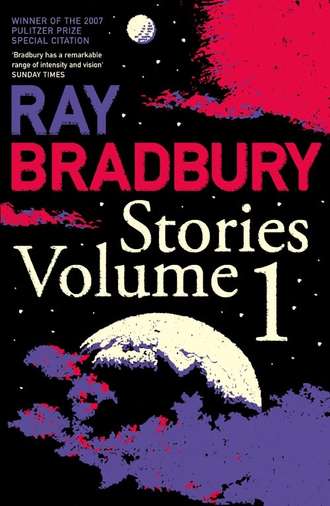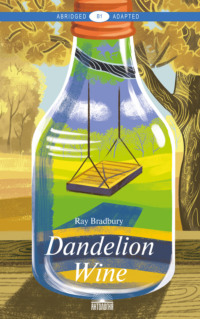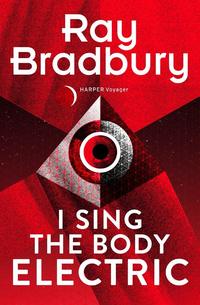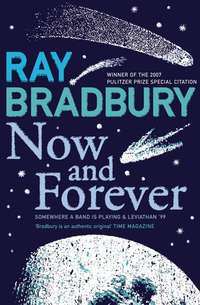
Полная версия
Ray Bradbury Stories Volume 1
‘But other times—’
‘Other times I can’t help myself. I bake pies and treat him as if he were alive, and then it hurts. No, it’s better to think he hasn’t been here for ten years and I’ll never see him again. It doesn’t hurt as much.’
‘Didn’t he say next time he’d settle down?’
She shook her head slowly. ‘No, he’s dead. I’m very sure of that.’
‘He’ll come alive again, then,’ I said.
‘Ten years ago,’ said Mother. ‘I thought, What if he dies on Venus? Then we’ll never be able to see Venus again. What if he dies on Mars? We’ll never be able to look at Mars again, all red in the sky, without wanting to go in and lock the door. Or what if he died on Jupiter or Saturn or Neptune? On those nights when those planets were high in the sky, we wouldn’t want to have anything to do with the stars.’
‘I guess not.’ I said.
The message came the next day.
The messenger gave it to me and I read it standing on the porch. The sun was setting. Mom stood in the screen door behind me, watching me fold the message and put it in my pocket.
‘Mom,’ I said.
‘Don’t tell me anything I don’t already know,’ she said.
She didn’t cry.
Well, it wasn’t Mars, and it wasn’t Venus, and it wasn’t Jupiter or Saturn that killed him. We wouldn’t have to think of him every time Jupiter or Saturn or Mars lit up the evening sky.
This was different.
His ship had fallen into the sun.
And the sun was big and fiery and merciless, and it was always in the sky and you couldn’t get away from it.
So for a long time after my father died my mother slept through the days and wouldn’t go out. We had breakfast at midnight and lunch at three in the morning, and dinner at the cold dim hour of 6 A.M. We went to all-night shows and went to bed at sunrise.
And, for a long while, the only days we ever went out to walk were the days when it was raining and there was no sun.
Marionettes, Inc.
They walked slowly down the street at about ten in the evening, talking calmly. They were both about thirty-five, both eminently sober.
‘But why so early?’ said Smith.
‘Because,’ said Braling.
‘Your first night out in years and you go home at ten o’clock.’
‘Nerves, I suppose.’
‘What I wonder is how you ever managed it. I’ve been trying to get you out for ten years for a quiet drink. And now, on the one night, you insist on turning in early.’
‘Mustn’t crowd my luck,’ said Braling.
‘What did you do, put sleeping powder in your wife’s coffee?’
‘No, that would be unethical. You’ll see soon enough.’
They turned a corner. ‘Honestly, Braling, I hate to say this, but you have been patient with her. You may not admit it to me, but marriage has been awful for you, hasn’t it?’
‘I wouldn’t say that.’
‘It’s got around, anyway, here and there, how she got you to marry her. That time back in 1979 when you were going to Rio—’
‘Dear Rio. I never did see it after all my plans.’
‘And how she tore her clothes and rumpled her hair and threatened to call the police unless you married her.’
‘She always was nervous, Smith, understand.’
‘It was more than unfair. You didn’t love her. You told her as much, didn’t you?’
‘I recall that I was quite firm on the subject.’
‘But you married her anyhow.’
‘I had my business to think of, as well as my mother and father. A thing like that would have killed them.’
‘And it’s been ten years.’
‘Yes,’ said Braling, his gray eyes steady. ‘But I think perhaps it might change now. I think what I’ve waited for has come about. Look here.’
He drew forth a long blue ticket.
‘Why, it’s a ticket for Rio on the Thursday rocket!’
‘Yes, I’m finally going to make it.’
‘But how wonderful! You do deserve it! But won’t she object? Cause trouble?’
Braling smiled nervously. ‘She won’t know I’m gone. I’ll be back in a month and no one the wiser, except you.’
Smith sighed. ‘I wish I were going with you.’
‘Poor Smith, your marriage hasn’t exactly been roses, has it?’
‘Not exactly, married to a woman who overdoes it. I mean, after all, when you’ve been married ten years, you don’t expect a woman to sit on your lap for two hours every evening, call you at work twelve times a day and talk baby talk. And it seems to me that in the last month she’s gotten worse. I wonder if perhaps she isn’t a little simple-minded?’
‘Ah, Smith, always the conservative. Well, here’s my house. Now, would you like to know my secret? How I made it out this evening?’
‘Will you really tell?’
‘Look up, there!’ said Braling.
They both stared up through the dark air.
In the window above them, on the second floor, a shade was raised. A man about thirty-five years old, with a touch of gray at either temple, sad gray eyes, and a small thin mustache looked down at them.
‘Why, that’s you!’ cried Smith.
‘Sh-h-h, not so loud!’ Braling waved upward. The man in the window gestured significantly and vanished.
‘I must be insane,’ said Smith.
‘Hold on a moment.’
They waited.
The street door of the apartment opened and the tall spare gentleman with the mustache and the grieved eyes came out to meet them.
‘Hello, Braling,’ he said.
‘Hello, Braling,’ said Braling.
They were identical.
Smith stared. ‘Is this your twin brother? I never knew—’
‘No, no,’ said Braling quietly. ‘Bend close. Put your ear to Braling Two’s chest.’
Smith hesitated and then leaned forward to place his head against the uncomplaining ribs.
Tick-tick-tick-tick-tick-tick-tick-tick.
‘Oh no! It can’t be!’
‘It is.’
‘Let me listen again.’
Tick-tick-tick-tick-tick-tick-tick-tick.
Smith staggered back and fluttered his eyelids, appalled. He reached out and touched the warm hands and the cheeks of the thing.
‘Where’d you get him?’
‘Isn’t he excellently fashioned?’
‘Incredible. Where?’
‘Give the man your card, Braling Two.’
Braling Two did a magic trick and produced a white card:
MARIONETTES, INC.
Duplicate self or friends: new humanoid plastic 1990 models, guaranteed against all physical wear. From $7,600 to our $15,000 de luxe model.
‘No,’ said Smith.
‘Yes,’ said Braling.
‘Naturally,’ said Braling Two.
‘How long has this gone on?’
‘I’ve had him for a month. I keep him in the cellar in a toolbox. My wife never goes downstairs, and I have the only lock and key to that box. Tonight I said I wished to take a walk to buy a cigar. I went down cellar and took Braling Two out of his box and sent him back up to sit with my wife while I came on out to see you, Smith.’
‘Wonderful! He even smells like you: Bond Street and Melachrinos!’
‘It may be splitting hairs, but I think it highly ethical. After all, what my wife wants most of all is me. This marionette is me to the hairiest detail. I’ve been home all evening. I shall be home with her for the next month. In the meantime another gentleman will be in Rio after ten years of waiting. When I return from Rio, Braling Two here will go back in his box.’
Smith thought that over a minute or two. ‘Will he walk around without sustenance for a month?’ he finally asked.
‘For six months if necessary. And he’s built to do everything – eat, sleep, perspire – everything, natural as natural is. You’ll take good care of my wife, won’t you, Braling Two?’
‘Your wife is rather nice,’ said Braling Two. ‘I’ve grown rather fond of her.’
Smith was beginning to tremble. ‘How long has Marionettes, Inc., been in business?’
‘Secretly, for two years.’
‘Could I – I mean, is there a possibility—’ Smith took his friend’s elbow earnestly. ‘Can you tell me where I can get one, a robot, a marionette, for myself? You will give me the address, won’t you?’
‘Here you are.’
Smith took the card and turned it round and round. ‘Thank you,’ he said. ‘You don’t know what this means. Just a little respite. A night or so, once a month even. My wife loves me so much she can’t bear to have me gone an hour. I love her dearly, you know, but remember the old poem: “Love will fly if held too lightly, love will die if held too tightly.” I just want her to relax her grip a little bit.’
‘You’re lucky, at least, that your wife loves you. Hate’s my problem. Not so easy.’
‘Oh, Nettie loves me madly. It will be my task to make her love me comfortably.’
‘Good luck to you, Smith. Do drop around while I’m in Rio. It will seem strange, if you suddenly stop calling by, to my wife. You’re to treat Braling Two, here, just like me.’
‘Right! Good-by. And thank you.’
Smith went smiling down the street. Braling and Braling Two turned and walked into the apartment hall.
On the crosstown bus Smith whistled softly, turning the white card in his fingers:
Clients must be pledged to secrecy, for while an act is pending in Congress to legalize Marionettes, Inc., it is still a felony, if caught, to use one.
‘Well,’ said Smith.
Clients must have a mold made of their body and a color index check of their eyes, lips, hair, skin, etc. Clients must expect to wait for two months until their model is finished.
Not so long, thought Smith. Two months from now my ribs will have a chance to mend from the crushing they’ve taken. Two months from now my hand will heal from being so constantly held. Two months from now my bruised underlip will begin to reshape itself. I don’t mean to sound ungrateful … He flipped the card over.
Marionettes, Inc., is two years old and has a fine record of satisfied customers behind it. Our motto is ‘No Strings Attached.’ Address: 43 South Wesley Drive.
The bus pulled to his stop; he alighted, and while humming up the stairs he thought, Nettie and I have fifteen thousand in our joint bank account. I’ll just slip eight thousand out as a business venture, you might say. The marionette will probably pay back my money, with interest, in many ways. Nettie needn’t know. He unlocked the door and in a minute was in the bedroom. There lay Nettie, pale, huge, and piously asleep.
‘Dear Nettie.’ He was almost overwhelmed with remorse at her innocent face there in the semidarkness. ‘If you were awake you would smother me with kisses and coo in my ear. Really, you make me feel like a criminal. You have been such a good, loving wife. Sometimes it is impossible for me to believe you married me instead of that Bud Chapman you once liked. It seems that in the last month you have loved me more wildly than ever before.’
Tears came to his eyes. Suddenly he wished to kiss her, confess his love, tear up the card, forget the whole business. But as he moved to do this, his hand ached and his ribs cracked and groaned. He stopped, with a pained look in his eyes, and turned away. He moved out into the hall and through the dark rooms. Humming, he opened the kidney desk in the library and filched the bankbook. ‘Just take eight thousand dollars is all,’ he said. ‘No more than that.’ He stopped. ‘Wait a minute.’
He rechecked the bankbook frantically. ‘Hold on here!’ he cried. ‘Ten thousand dollars is missing!’ He leaped up. ‘There’s only five thousand left! What’s she done? What’s Nettie done with it? More hats, more clothes, more perfume! Or, wait – I know! She bought that little house on the Hudson she’s been talking about for months, without so much as a by your leave!’
He stormed into the bedroom, righteous and indignant. What did she mean, taking their money like this? He bent over her. ‘Nettie!’ he shouted. ‘Nettie, wake up!’
She did not stir. ‘What’ve you done with my money!’ he bellowed.
She stirred fitfully. The light from the street flushed over her beautiful cheeks.
There was something about her. His heart throbbed violently. His tongue dried. He shivered. His knees suddenly turned to water. He collapsed. ‘Nettie, Nettie!’ he cried. ‘What’ve you done with my money!’
And then, the horrid thought. And then the terror and the loneliness engulfed him. And then the fever and disillusionment. For, without desiring to do so, he bent forward and yet forward again until his fevered ear was resting firmly and irrevocably upon her round pink bosom. ‘Nettie!’ he cried.
Tick-tick-tick-tick-tick-tick-tick-tick-tick-tick-tick.
As Smith walked away down the avenue in the night, Braling and Braling Two turned in at the door to the apartment. ‘I’m glad he’ll be happy too,’ said Braling.
‘Yes,’ said Braling Two abstractedly.
‘Well, it’s the cellar box for you, B-Two.’ Braling guided the other creature’s elbow down the stairs to the cellar.
‘That’s what I want to talk to you about,’ said Braling Two, as they reached the concrete floor and walked across it. ‘The cellar. I don’t like it. I don’t like that toolbox.’
‘I’ll try and fix up something more comfortable.’
‘Marionettes are made to move, not lie still. How would you like to lie in a box most of the time?’
‘Well—’
‘You wouldn’t like it at all. I keep running. There’s no way to shut me off. I’m perfectly alive and I have feelings.’
‘It’ll only be a few days now. I’ll be off to Rio and you won’t have to stay in the box. You can live upstairs.’
Braling Two gestured irritably. ‘And when you come back from having a good time, back in the box I go.’
Braling said, ‘They didn’t tell me at the marionette shop that I’d get a difficult specimen.’
‘There’s a lot they don’t know about us,’ said Braling Two. ‘We’re pretty new. And we’re sensitive. I hate the idea of you going off and laughing and lying in the sun in Rio while we’re stuck here in the cold.’
‘But I’ve wanted that trip all my life,’ said Braling quietly.
He squinted his eyes and could see the sea and the mountains and the yellow sand. The sound of the waves was good to his inward mind. The sun was fine on his bared shoulders. The wine was most excellent.
‘I’ll never get to go to Rio,’ said the other man. ‘Have you thought of that?’
‘No, I—’
‘And another thing. Your wife.’
‘What about her?’ asked Braling, beginning to edge toward the door.
‘I’ve grown quite fond of her.’
‘I’m glad you’re enjoying your employment.’ Braling licked his lips nervously.
‘I’m afraid you don’t understand. I think – I’m in love with her.’
Braling took another step and froze. ‘You’re what?’
‘And I’ve been thinking,’ said Braling Two, ‘how nice it is in Rio and how I’ll never get there, and I’ve thought about your wife and – I think we could be very happy.’
‘Th-that’s nice.’ Braling strolled as casually as he could to the cellar door. ‘You won’t mind waiting a moment, will you? I have to make a phone call.’
‘To whom?’ Braling Two frowned.
‘No one important.’
‘To Marionettes, Incorporated? To tell them to come get me?’
‘No, no – nothing like that!’ He tried to rush out the door.
A metal-firm grip seized his wrists. ‘Don’t run!’
‘Take your hands off!’
‘No.’
‘Did my wife put you up to this?’
‘No.’
‘Did she guess? Did she talk to you? Does she know? Is that it?’ He screamed. A hand clapped over his mouth.
‘You’ll never know, will you?’ Braling Two smiled delicately. ‘You’ll never know.’
Braling struggled. ‘She must have guessed; she must have affected you!’
Braling Two said, ‘I’m going to put you in the box, lock it, and lose the key. Then I’ll buy another Rio ticket for your wife.’
‘Now, now, wait a minute. Hold on. Don’t be rash. Let’s talk this over!’
‘Good-by. Braling.’
Braling stiffened. ‘What do you mean, “good-by”?’
Ten minutes later Mrs Braling awoke. She put her hand to her cheek. Someone had just kissed it. She shivered and looked up. ‘Why – you haven’t done that in years,’ she murmured.
‘We’ll see what we can do about that,’ someone said.
No Particular Night or Morning
He had smoked a packet of cigarettes in two hours.
‘How far out in space are we?’
‘A billion miles.’
‘A billion miles from where?’ said Hitchcock.
‘It all depends,’ said Clemens, not smoking at all. ‘A billion miles from home, you might say.’
‘Then say it.’
‘Home. Earth. New York. Chicago. Wherever you were from.’
‘I don’t even remember,’ said Hitchcock. ‘I don’t even believe there is an Earth now, do you?’
‘Yes,’ said Clemens. ‘I dreamt about it this morning.’
‘There is no morning in space.’
‘During the night then.’
‘It’s always night,’ said Hitchcock quietly. ‘Which night do you mean?’
‘Shut up,’ said Clemens irritably. ‘Let me finish.’
Hitchcock lit another cigarette. His hand did not shake, but it looked as if, inside the sunburned flesh, it might be tremoring all to itself, a small tremor in each hand and a large invisible tremor in his body. The two men sat on the observation corridor floor, looking out at the stars. Clemens’s eyes flashed, but Hitchcock’s eyes focused on nothing; they were blank and puzzled.
‘I woke up at 0500 hours myself,’ said Hitchcock, as if he were talking to his right hand. ‘And I heard myself screaming, “Where am I? where am I?” And the answer was “Nowhere!” And I said, “Where’ve I been?” And I said, “Earth!” “What’s Earth?” I wondered. “Where I was born,” I said. But it was nothing and worse than nothing. I don’t believe in anything I can’t see or hear or touch. I can’t see Earth, so why should I believe in it? It’s safer this way, not to believe.’
‘There’s Earth.’ Clemens pointed, smiling. ‘That point of light there.’
‘That’s not Earth; that’s our sun. You can’t see Earth from here.’
‘I can see it. I have a good memory.’
‘It’s not the same, you fool,’ said Hitchcock suddenly. There was a touch of anger in his voice. ‘I mean see it. I’ve always been that way. When I’m in Boston, New York is dead. When I’m in New York, Boston is dead. When I don’t see a man for a day, he’s dead. When he comes walking down the street, my God, it’s a resurrection. I do a dance, almost, I’m so glad to see him. I used to, anyway. I don’t dance any more. I just look. And when the man walks off, he’s dead again.’
Clemens laughed. ‘It’s simply that your mind works on a primitive level. You can’t hold on to things. You’ve got no imagination. Hitchcock, old man. You’ve got to learn to hold on.’
‘Why should I hold on to things I can’t use?’ said Hitchcock, his eyes wide, still staring into space. ‘I’m practical. If Earth isn’t here for me to walk on, you want me to walk on a memory? That hurts. Memories, as my father once said, are porcupines. To hell with them! Stay away from them. They make you unhappy. They ruin your work. They make you cry.’
‘I’m walking on Earth right now,’ said Clemens, squinting to himself, blowing smoke.
‘You’re kicking porcupines. Later in the day you won’t be able to eat lunch, and you’ll wonder why,’ said Hitchcock in a dead voice. ‘And it’ll be because you’ve got a footful of quills aching in you. To hell with it! If I can’t drink it, pinch it, punch it, or lie on it, then I say drop it in the sun. I’m dead to Earth. It’s dead to me. There’s no one in New York weeping for me tonight. Shove New York. There isn’t any season here; winter and summer are gone. So is spring, and autumn. It isn’t any particular night or morning: it’s space and space. The only thing right now is you and me and this rocket ship. And the only thing I’m positive of is me. That’s all of it.’
Clemens ignored this. ‘I’m putting a dime in the phone slot right now,’ he said, pantomiming it with a slow smile. ‘And calling my girl in Evanston. Hello, Barbara!’
The rocket sailed on through space.
The lunch bell rang at 1305 hours. The men ran by on soft rubber sneakers and sat at the cushioned tables.
Clemens wasn’t hungry.
‘See, what did I tell you!’ said Hitchcock. ‘You and your damned porcupines! Leave them alone, like I told you. Look at me, shoveling away food.’ He said this with a mechanical, slow, and unhumorous voice. ‘Watch me.’ He put a big piece of pie in his mouth and felt it with his tongue. He looked at the pie on his plate as if to see the texture. He moved it with his fork. He felt the fork handle. He mashed the lemon filling and watched it jet up between the tines. Then he touched a bottle of milk all over and poured out half a quart into a glass, listening to it. He looked at the milk as if to make it whiter. He drank the milk so swiftly that he couldn’t have tasted it. He had eaten his entire lunch in a few minutes, cramming it in feverishly, and now he looked around for more, but it was gone. He gazed out the window of the rocket, blankly. ‘Those aren’t real either,’ he said.
‘What?’ asked Clemens.
‘The stars. Who’s ever touched one? I can see them, sure, but what’s the use of seeing a thing that’s a million or a billion miles away? Anything that far off isn’t worth bothering with.’
‘Why did you come on this trip?’ asked Clemens suddenly.
Hitchcock peered into his amazingly empty milk glass and clenched it tight, then relaxed his hand and clenched it again. ‘I don’t know.’ He ran his tongue on the glass rim. ‘I just had to, is all. How do you know why you do anything in this life?’
‘You liked the idea of space travel? Going places?’
‘I don’t know. Yes. No. It wasn’t going places. It was being between.’ Hitchcock for the first time tried to focus his eyes upon something, but it was so nebulous and far off that his eyes couldn’t make the adjustment, though he worked his face and hands. ‘Mostly it was space. So much space. I liked the idea of nothing on top, nothing on the bottom, and a lot of nothing in between, and me in the middle of the nothing.’
‘I never heard it put that way before.’
‘I just put it that way; I hope you listened.’
Hitchcock took out his cigarettes and lit up and began to suck and blow smoke, again and again.
Clemens said, ‘What sort of childhood did you have, Hitchcock?’
‘I was never young. Whoever I was then is dead. That’s more of your quills. I don’t want a hideful, thanks. I’ve always figured it that you die each day and each day is a box, you see, all numbered and neat; but never go back and lift the lids, because you’ve died a couple of thousand times in your life, and that’s a lot of corpses, each dead a different way, each with a worse expression. Each of those days is a different you, somebody you don’t know or understand or want to understand.’
‘You’re cutting yourself off, that way.’
‘Why should I have anything to do with that younger Hitchcock? He was a fool, and he was yanked around and taken advantage of and used. His father was no good, and he was glad when his mother died, because she was the same. Should I go back and see his face on that day and gloat over it? He was a fool.’
‘We’re all fools,’ said Clemens. ‘all the time. It’s just we’re a different kind each day. We think, I’m not a fool today. I’ve learned my lesson. I was a fool yesterday but not this morning. Then tomorrow we find out that, yes, we were a fool today too. I think the only way we can grow and get on in this world is to accept the fact that we’re not perfect and live accordingly.’
‘I don’t want to remember imperfect things,’ said Hitchcock. ‘I can’t shake hands with that younger Hitchcock, can I? Where is he? Can you find him for me? He’s dead, so to hell with him! I won’t shape what I do tomorrow by some lousy thing I did yesterday.’









